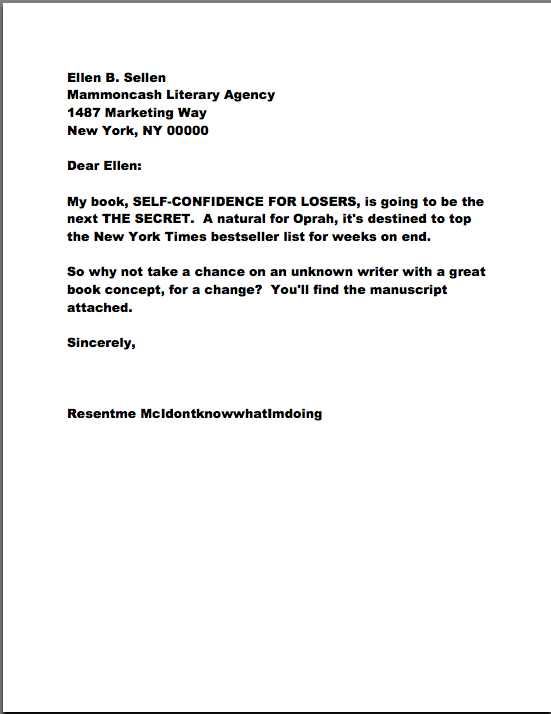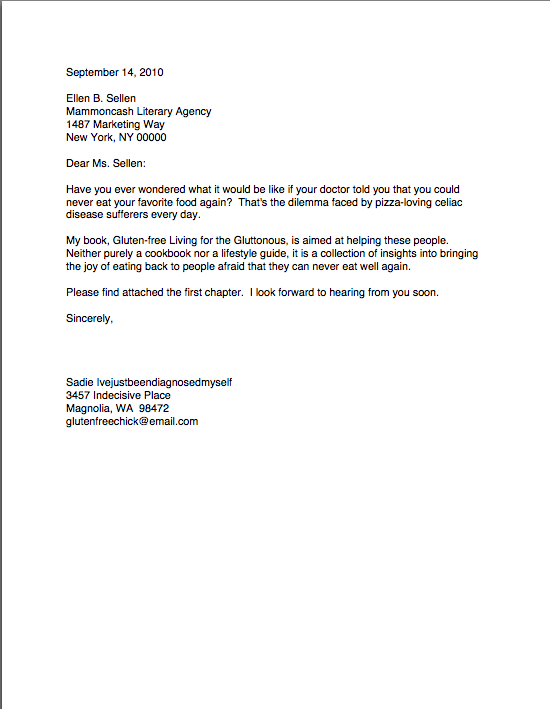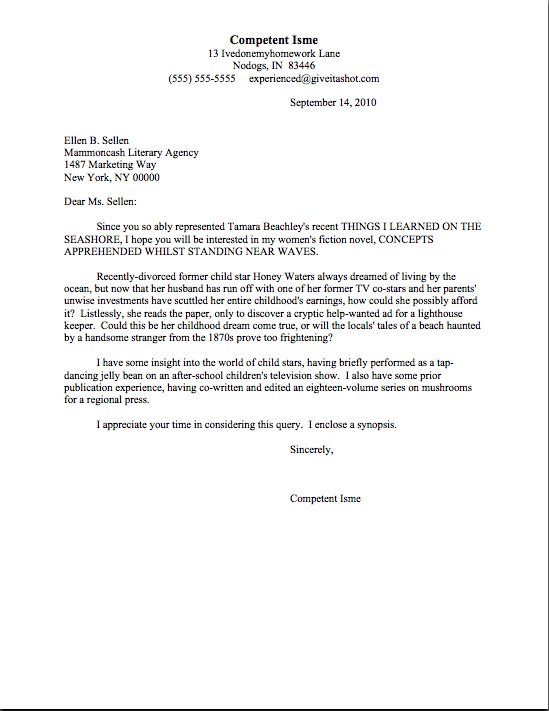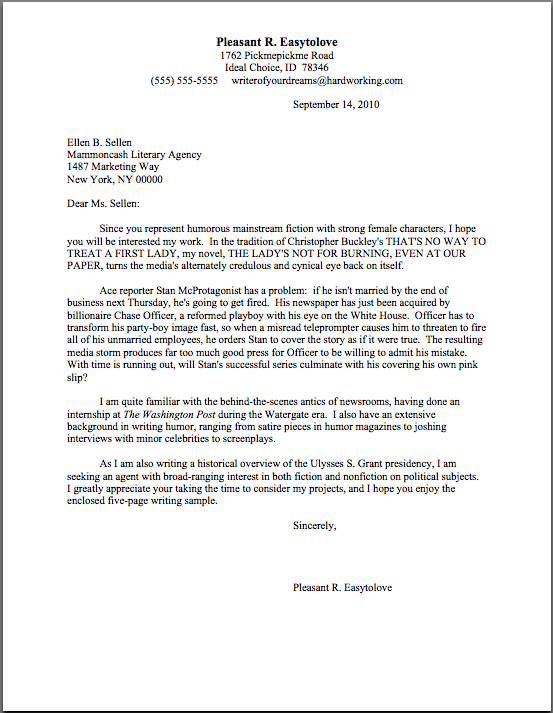
It’s going to be a comparatively short one this evening, I’m afraid, campers: the apprehensions I expressed in this morning’s post about the length of the recovery time I would need after today’s physical therapy session turned out to be exceptionally well-founded. (For those of you new to the Author! Author! community, my car was the meat in a pile-up sandwich at the end of July: thus the PT. But also thus my having the enforced leisure time to post several times per day during Querypalooza. The accident giveth; the accident taketh away.) I’m just exhausted; thus the later-than-usual posting.
On the bright side, that puts me in precisely the right frame of mind to appreciate how most queriers feel when they’re trying to work up energy to send out Query #19 right after Rejection #18 arrives, doesn’t it? My sympathies on how hard it is to pick yourself up, dust yourself off, and proceed to the next name on your agent list right away, but trust me, the longer that rejection sits on your desk, the harder it will be to work up energy to do it at all.
Don’t give yourself time to talk yourself out of sending the next one. Keep pressing forward. Remember, the only manuscript that stands no chance of interesting an agent and getting published is the one that sits in a drawer, perpetually unqueried.
Speaking of pressing forward, as we have been moving through this long series on querying and submission — which admittedly, probably feels longer to me than to you; writing 25 posts in 11 days has caused me to wilt a trifle — you may have noticed that I keep re-using a key phrase. I have been encouraging savvy writers to do their homework on individual agency guidelines before they send off a query; I’ve pointed out that this or that faux pas just screams at Millicent the agency screener that the queriers who commit them have not done their homework; the single best means of figuring out a book’s marketing category is — wait for it — for writers to do their homework about what similar books are currently on the market.
I’m not the only querying guru fond of this phrase, as it happens. You can’t throw a piece of bread at a writers’ conference without hitting an agent, editor, contest judge, or writing coach loudly deploring just how few of the aspiring writers they meet seem to have do their homework before querying, submitting, pitching, entering a contest, or anything else that would require putting ink on paper and handing it to somebody in a position to evaluate it professionally.
Were all of these people kids who just adored homework, begging their teachers for more and more of it? Well, I can picture Millicent begging her English teacher for more of those nifty extra credit assignments (as I did growing up, I must confess), but otherwise, most of these homework-pushers were probably not all that fond of it themselves.
What makes me think so? Listen to the way this advice is almost invariably phrased: the aspiring writer should do the homework, not the person giving the advice. The advice-giver doesn’t have to: he already knows the ropes.
Why is this phrase so ubiquitous in professional reader circles? Well, not being a mind-reader, I can’t say for certain what each and every speaker who spouts it is thinking, but I can hazard a guess: it probably stems from the fact that a good half of the queries any agency receives are so unprofessionally put together and worded that they might as well be billboards declaiming THIS ASPIRING WRITER DID NOT TAKE THE TIME TO LEARN HOW AGENCIES WORK BEFORE POPPING THIS INTO THE MAIL.
“Half?” a good quarter of you ask, gulping. “Seriously, that many?”
Actually, most of the agents I know place the percentage closer to 60% and rising. Why might it be going up? Again, I don’t profess to be a mind-reader, but I’ll take a crack at an answer: with the rise of the Internet, it’s not only become much, much easier to generate a list of who represents what kind of book; with the relative ease of e-mailed queries, it’s become substantially less expensive and time-consuming for an ambitious non-homework-doer to query 75 agents in a weekend.
Often, unfortunately, with missives like the charmer below. Like so many present-day generic queries, this one has the agent’s name and address mail-merged into the top, to give it the appearance of a personalized letter.

Don’t believe that this is a representative sample? Actually, you’re right: this letter is spelled far too well.
I would hope that by this late point in Querypalooza, I would not need to elaborate on what’s wrong with this query. (Arial Black 14 point type? Please!) Obviously, it contains none of the required elements but the title, so its chances of charming Millicent into reading so much as a syllable of the attached manuscript are approximately nil. (And she wouldn’t even read the query to know how bad it was if she worked at one of the many, many agencies that does not accept unsolicited submissions — Resentme is really racking up the instant-rejection points here, isn’t he?)
Clearly, this writer has not done his homework: he doesn’t know what a query letter is supposed to do, other than act as an introduction to a stack of paper. Yet even if by some miracle Millicent decided to look past this query’s complete lack of requisite information, writing style, and professional presentation, this writer still could not possibly receive any benefit from having sent this query. Any guesses why?
If you immediately cried out, “For heaven’s sake, Anne, the guy forgot to include his contact information!” you have more than earned your extra credit points for the day. Even homework-doing writers forget to include these salient details all the time — a genuine pity, because when Millicent unearths a truly professional-looking query for an interesting book of the variety her boss typically represents in a day’s mail, she gets excited about it. How sad, then, if she has no way to convey that excitement — or a request for pages — to the person who wrote it.
A small forest of raised hands just sprouted out there in the ether. “But Anne,” the puzzled masses shout with one voice, “I only query via e-mail. So I don’t have to worry about this contact information stuff, right? All Millicent has to do to contact me is hit REPLY.”
Well, technically, yes, puzzled masses — if she happens to make up her mind while the e-mail is still on her screen. (Oh, your finger has never slipped while you were scrolling through e-mails, accidentally deleting something you wanted to keep?) And if she is empowered to ask for pages without consulting a higher-up — which may not be the case yet, if she just started her new screening gig, say, immediately after Labor Day. If she is required to forward the queries she liked up the ladder, her supervisor’s hitting SEND would shoot the missive back to her, not to you.
But none of that is the primary reason every query, every query packet, and every submission packet should include the sender’s full contact information, including phone number, mailing address, and e-mail address. You should do it because you don’t want Millicent to have to waste even a moment thinking, oh, didn’t this writer remember to tell me how to get ahold of her? Didn’t she do her homework?
Speaking of the perils of not doing one’s homework, did you catch the other omission that would instantly cause Millicent to grind her teeth and cry, “This is a form letter! Resentme has probably sent this to every agent in North America within the last 24 hours. Next!”
Any guesses? How about the fact that the letter is not dated, presumably so the sender can reuse it in perpetuity?
Seriously, this is a classic agents’ pet peeve — precisely because it’s an extremely common time-saving technique for all of the Resentmes out there. Or at least it was back when lazy aspiring writers had to rely upon Xerox machines, rather than just hitting the print key repeatedly or SEND, to wallpaper New York with completely generic queries.
Why does the very sight of a generic query make Millicent’s fingertips itch to clutch a form-letter rejection? Well, for starters, they make her job more difficult: generic queries virtually never give her any hint about (a) the book in question’s category (so she will have to guess whether it falls into one that someone at her agency actually represents), (b) why the writer thinks her boss would be a good fit for it (since a generic query is intended for every agent’s eyes, it cannot afford to be specific), and/or (c) what might make this book marketable (because that would require the querier to do a bit of, you guessed it, homework).
So can you really blame her for leaping to the conclusion that the sender just didn’t do his homework? Or for assuming, as most professional readers would, that a writer who didn’t do his homework about how to write a query probably didn’t do his homework about how to format a manuscript, either? Even in an agency already resigned to explaining how the publishing industry does and doesn’t work to first-time authors, a non-homework doer would stand out an unusually energy-sapping client: he doesn’t even know enough about the ropes of the industry to know that he should learn how to climb them.
The second reason that obviously generic queries tend to engender such universally negative reactions amongst screeners — other than the fact that they’re often phrased as demands for attention, rather than requests for assistance, that is — lies in human nature. No one likes to be treated as if she were a service-providing machine. Good agents have a right to be proud of what they do: they help bring great writing (and great writers) to publication.
So what’s wrong with their appreciating queriers who have taken the time to find out about what they have sold in the past more than those who address them as though any agent were as good as any other? Or preferring queriers who phrase their requests politely, in a query that deliberately speaks to the agent’s individual interests, over those who are quite clearly just trying to hit as many agencies in as short a time as possible?
Why should we blame them, in short, for preferring writers who have obviously done their homework to those who equally obviously have not?
The problem is, it’s getting harder to tell the difference. Ten years ago, there was a lot less querying advice available upon demand. Today, anyone with the minimal technical ability to perform a Google search of the word query might well find within just a few clicks a prototype that avoids the faux pas above entirely.
The result: it takes more time to screen queries now — and if you think that those of us who give online advice on the subject haven’t caught some heat for that, think again.
Oh, the truly bad generic queries are as bad as they ever were; there are, fortunately for Millicent’s desk-clearing rates, still many, many aspiring writers who evidently do no homework at all. However, they now make up a lower percentage of queries, since there are so many passable prototypes floating around the Internet. Pretty much anyone can find a template into which he can simply plug his information instead of writing a truly unique query letter from scratch.
So what ends up on Millicent’s desk on any given is 150 letters rather like this:

with perhaps one like the following somewhere in the middle of the stack:

Both are generally passable by prevailing wisdom standards, right? Millicent actually does have to read a bit closer in order to separate the wheat from the chaff.
Please tell me, though, that it was clear to you why the second was better. Competent told Millicent why she picked this particular agent (complimenting a current client’s book is always a classy touch), described her premise well, and listed a couple of legitimate credentials for this particular book. Perhaps her book’s title was a trifle derivative of the existing client’s, but overall, this query did what it needed to do.
The first example, sadly, did not. True, Sadie did open the first with an eye-catching hook statement (and not a bad one, either), but she made Millicent guess the book category — probably because Sadie wasn’t sure of it herself. She’s also left Millie to guess what her qualifications are to write this particular book. And what on earth does a collection of insights mean, anyway? It isn’t even clear from this query whether what’s being offered is a how-to book for living with a food restriction, a quote book, or an illness memoir.
In short, it would be pretty obvious to a careful reader which writer had done her homework and which hadn’t.
However, if Millicent happened to be having a bad day — and who is more entitled, really? — both of these writers would have ended up holding a form-letter rejection from this agency. Did anyone happen to spot the notorious agents’ pet peeve in Competent’s first paragraph that might have caused our Millie to choke irritably on her too-hot latte and reach gaspingly for the form-letter pile?
No one could blame you if you missed it, because it’s quite subtle: Competent referred to her book as a fiction novel. Technically, this is redundant; all novels are fiction, by definition.
Which is why, in case anybody had been wondering, professional writers often take a moment or two to answer the ubiquitous question, “Oh, you’ve just finished a novel? Fiction or nonfiction?” Like everyone else even vaguely affiliated with the publishing industry, we have to tamp down our knee-jerk response: there’s no such thing as a nonfiction novel, silly!
Actually, the epithet at the end of that thought is usually quite a bit harsher, but this is a family-friendly site.
As I mentioned in passing earlier in this series, fiction novel is not the only phrase likely to provoke this reaction. So is true memoir. Or, perversely, sci-fi novel instead of science fiction novel.
Why the last one? Literary history, my dears: science fiction and fantasy had a hard time getting taken seriously as literature. That prejudice extends practically to this very moment: the first science fiction author to be included in the prestigious Library of America series was my old friend Philip K. Dick. In 2007, more than 25 years after his death.
The literary world’s slowness to embrace one of the great literary genres frequently used to take the form of insults aimed at SF writers. As late as the early 1980s, literary-voiced science fiction and fantasy was still routinely being dismissed in mainstream literary circles as just sci-fi. As in, “Oh, I never read sci-fi; that’s kid’s stuff.”
Historically, then, it’s been a matter of respect to refer to the category either by its full name, science fiction, or SF. So from the perspective of a Millicent who works at a science fiction-representing agency, an aspiring writer who refers to his own writing as a sci-fi novel clearly hasn’t done his homework about his own chosen book category.
Competent did do something clever, though: for an agent whom one has not had the opportunity to hear speak at a conference, read an article or blog authored by, or come up with some other excuse for picking him out of an agents’ guide, bringing up a current client’s most recent publication is a dandy justification. As a bonus, up-to-date client lists are almost always available on agency websites.
I just mention that for the benefit of those of you who might not have time to do much homework.
Let’s face it, these days, many, not most, aspiring writers decide whom to query not through extensive market research about who is selling what in their chosen book categories, but by plugging a book category into a search engine and sending a query to the first name that it spits out. Or first 25 names. Or, in some cases, all of ‘em.
I’ve already spoken enough about the advantages of personalizing one’s query to match each individual agent’s expressed preferences, literary tastes, and sales track record that I shall not take up blog space today by commenting again upon the strategic wisdom of this method of query list generation. Suffice it to say that I hope those of you who have followed Querypalooza from the beginning looked at that paragraph above and immediately muttered, “Wow, 25 agents. That’s going to be days of background research,” rather than, “There’s a search engine that would spit out more than 25 names for my list? Great — I’ll send out another 50 generic queries tomorrow.”
Normally, I would take issue with that last statement, energetically pointing out the many potential pitfalls into which a one-size-fits-all querying strategy is likely to lead a writer who — chant it with me now — hasn’t done his homework. But I’m very tired.
Besides, you’re intelligent people: you already have the tools to analyze the qualitative difference between a generic query and a well-personalized one yourself. Compare the following, for instance, with the examples above. All were written to be sent to the same agent, and all of the queriers had access, via the Internet, to precisely the same information about her.

Notice anything as you cast your eyes over these examples? Perhaps that what elevated the last two’s opening paragraphs was a single reference each to work the agent had done in the past? Just how long do you think it took either of those writers to dig up those tidbits on the agency website?
Word to the wise: the amount of homework required to personalize an already-solid draft query is not particularly extensive. Nor is the imperative to check each agency’s website or guide listing for specialized submission instructions especially onerous. It honestly is worth every second it takes.
Tomorrow morning, I shall wrap up our discussion of simultaneous submission, followed by a few more illustrative examples of query dos and don’ts tomorrow evening. Keep that dog far, far away from your homework, campers, and keep up the good work!
PS: t-shirts bearing the cute image at the top of this post are for sale at Fashionably Geek.
Thanks once again for the great examples, Anne. I particularly liked the difference between the last two examples in the opening paragraph.
You clearly showed how one could compose an opening with a category that contains Fiction in the description without stating Women’s Fiction novel or the like, banishing the inherent redundancy in example two.
My pleasure, Christie!
LOL Mammoncash Literary Agency…a comment on money over art perhaps?
I’ve worked and worked on my credentials paragraph, Anne, and my description. It sounds more exciting. I’m going to try another one. I have a much better letter all around this time; let’s see what happens.
That’s great to hear, Elizabeth. I have to say, were I Millicent, I think I would want to read a mystery by someone with your background.
Actually, I lifted the name Mammoncash from E.F. Benson — there’s a stockbroker by that name in one of his Lucia books. Did seem apt in this context, though.